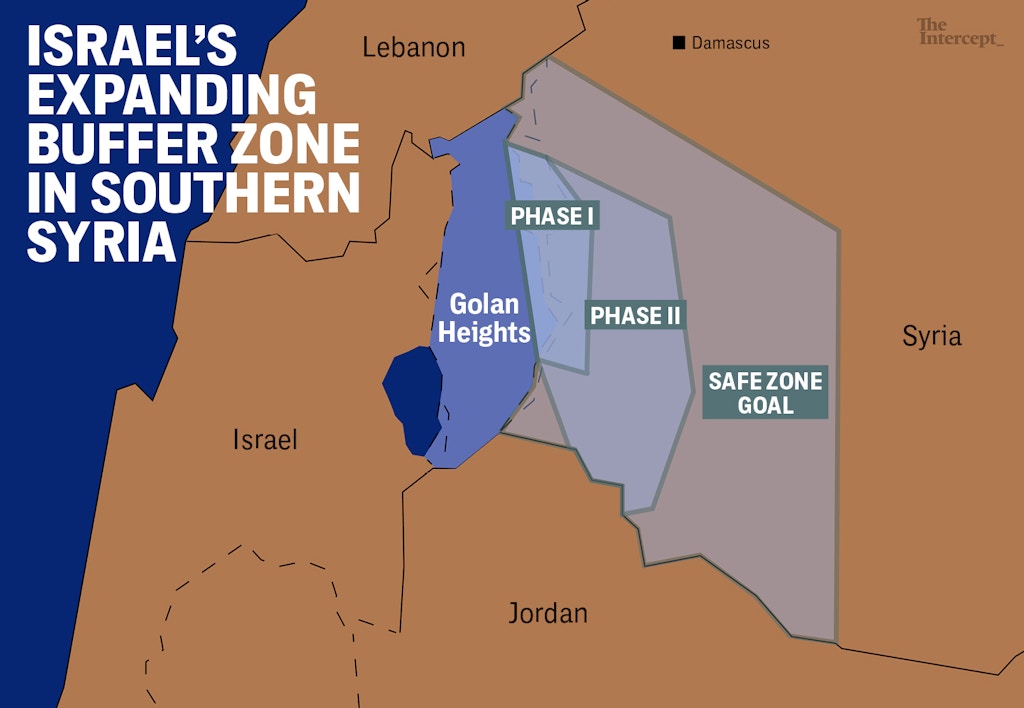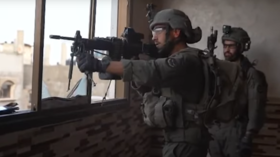ISRAEL’S “SAFE ZONE” IS CREEPING FARTHER INTO SYRIA
Israel is expanding its influence and control deeper into opposition-held southern Syria, according to multiple sources in the area. After failed attempts to ensure its interests were safeguarded by the major players in the war next door, Israel is pushing to implement the second phase of its “safe-zone” project — an attempt to expand a buffer ranging out from the occupied Golan Heights deeper into the southern Syrian provinces of Quneitra and Daraa. The safe zone expansion marks a move toward deeper Israeli involvement in Syria’s civil war.
The Intercept learned the outlines of the safe-zone expansion plan through a monthslong investigation relying on information from a variety of sources, including Syrian opposition activists on the ground in the south, Syrian opposition figures based in Jordan, Syrian government sources, and an Israeli-American NGO directly involved in the safe-zone project.
The safe zone appears intended to keep the Syrian army and its Iranian and Lebanese allies as far away from Israel’s border as possible, as well as solidify Israel’s control over the occupied Golan Heights. Israel seized the Golan from Syria in 1967’s Six-Day War. Expanding a buffer zone would likely make any negotiations over the return of the Syrian territory more difficult in the future, because the Golan Heights will be surrounded on both sides by areas with significant Israeli influence.
Over the last two years, Israel started building out the first phase of a safe zone in southern Syria. The project enabled the Israeli army, through humanitarian organizations and military personnel, to gain access to opposition-held areas in return for supplying aid, medical treatment inside Israel, and basic goods.
According to sources, the second phase, which is currently underway, includes, among other things, the establishment of a 40-kilometer, Israeli-monitored buffer beyond the Golan Heights, a Syrian border police force armed and trained by Israel, and greater involvement in civil administration in opposition-controlled areas in two southern provinces. The expansion of the project also involves military aid to a wider array of opposition factions in both Quneitra and Daraa. The wider buffer zone also sees partnerships being built up with Syrian opposition leaders, civil society leaders, NGOs, and health officials on the ground to work on joint educational, health, and agricultural projects.
Israel has launched numerous strikes into Syrian territory, often understood to be efforts to keep advanced weapons out of the hands of hostile militants, like those in Lebanon’s Hezbollah. However, the buffer zone — and its expansion — stand as a deeper and more long-term investment in the Syrian war. Last summer, I reported on Israel’s burgeoning support for a rebel faction called the Golan Knights. Subsequently, rebels speaking to the Wall Street Journal confirmed that the cash payments, which Israel claimed were purely humanitarian, were used for paying fighters’ salaries and purchasing weapons and ammunition.
Contacted for comment about the safe-zone expansion by an Intercept journalist in New York, an Israeli official, who refused to speak under any other attribution, said, “It’s a ridiculous and unfounded claim, that Israel is creating a buffer zone. Israel provides humanitarian aid as part of its values and to help strengthen stability.” Confronted with previous reporting about Israeli support for Syrian rebel factions in the vicinity of the Golan Heights, the official refused to comment.
As the war drags on, more Syrians inside opposition areas are reluctantly accepting Israel’s influence and involvement in their communities. “The humanitarian situation here is hard,” explained Abu Omar, an opposition activist who lives in the rebel-held town of Quneitra and asked to not to have his full name used because of the sensitivity of the subject. Abu Omar said that initially people in the area were against Israeli involvement in the area. Though he still opposes Israel’s presence, he said, others have changed their minds: “When Israel gives people salaries, medication, food, and water, people start to like them, and honestly today, it is not a small number; it is a now a large number.”
“They bought people with aid,” he said. “Although not all the residents accept Israeli involvement.”



